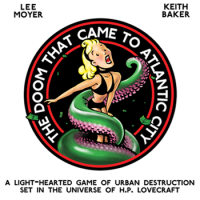
The Doom That Came To Atlantic City
It came from Cryptozoic! The Doom That Came To Atlantic City was a super successful Kickstarter campaign that was cancelled by its previous publisher. In comes Cryptozoic to make good to all the Kickstarter backers and believers.
Written and designed by Keith Baker with Concept, Art and Design by Lee Moyer and custom pieces by Sculptor Paul Komoda, The Doom that Came to Atlantic City board game invites players to assume the role of one of the Great Old Ones – beings of ancient eldritch power. Cosmic forces have held you at bay for untold eons, but at last the stars are right and your maniacal cult has called you forth. Once you regain your full powers, you will unleash your doom upon the world! There’s only one problem: you’re not alone. The other Great Old Ones are here as well, and your rivals are determined to steal your cultists and snatch victory from your flabby claws! It’s a race to the ultimate finish as you crush houses, smash holes in reality, and fight to call down The Doom That Came To Atlantic City!
Features
User Reviews (4)
Add a Review for "The Doom That Came To Atlantic City"
You must be logged in to add a review.


I wanted to love this game as a fan of the Mythos and all the related literature, games and so on. Recently while in bussines travel i visited a local store and found it by surprise, so i feel compeled to buy it, without having researched it so much. I take my final decision by the look of the Elders miniatures, they are awesome!
Sadly, after a couple of games, for me that miniatures have get the only good point on my purchase. On the bright sight they are a very good adquisition anways and will be present on our games of other Mythos realted play sessions.
The game for me and my usual gaming group is too much about the dice: movement is on the dice (ok, you can modify it from some sources, but still is highly random), combat is on the dice, and destruction is on the dice. Making some jokes about Monopoly could be even funny, but not for so much time, when some one is without resources (houses, cultist…) and lands on the banished square, cause your movement is random.
Anyway i can understand the game could be funny for some players, but i have to say that i can enjoy playing Mumchkin for example, and with this one not so much jokes are about to arise…
I cannnot understand also the mix on the design. The components are good quality, and as said you have 8 gorgeous Elders miniatures, and nice colored drawings of each one on your player board… to then find caricature drawings on the cards in a completely different style.
The price would be far than adecuated if not again for the miniatures. So i would say, if you are thinking to invest on it, be quite sure about the gameplay or on the other side do not think about it but you really really want the Elders on your table.
You’re not doubt familiar with the cautionary tale regarding Kickstarter and this game, so we’ll skip to the present, where Cryptozoic has swooped in and gotten the finished product to store shelves.
At first glance Doom seems like Cthulhu-flavored Monopoly, which I agree would be lame in the extreme, but it’s thankfully well beyond that. Dare I say it’s actually much more fun to play than Monopoly. In this game you don’t build the properties, you’re an elder god smashing them down. You don’t just get money or get zipped around the board when drawing a card: you get powers and buffs. There’s combat between players to keep things interesting, bonuses and penalties for rolling doubles, and random alternate win conditions beyond the standard one(being the first to open six gates).
There’s lots of goodies included in box, which helps makes the price tag($75) easier to swallow. You get beautifully sculpted pieces of each elder god, houses, cultists, and lots of cards and counters. The artwork only takes a bit of a dive on the Chants and Providence(get it?) cards, which are still cute even though they’re sloppy.
My only real beef with this game is the lack of clarity in the rulebook. Certain things are never addressed at all, sadly, which just reeks of laziness or lack of a proofreader/playtester, but seasoned gamers can fill in the blanks easily enough.
I strongly recommend this one, particularly as a great party game for Lovecraft fans or folks who want to bridge the gap between casual play and something a bit more involved. Hopefully those of you who helped kickstart it have received your copies. In my opinion it is worth the headache and the wait.
I really enjoyed this game! Having grown up with Monopoly as the only game we had in the house, I cannot bring myself to play it. This twist on the old classic is great!
I find that it has plenty of replay value. Since dice are involved, the game has a large luck component to it, making its outcomes different every time.
Also, the figures and the art are amazing. The box itself is a bit unassuming, but once inside, brace yourself for some great components.
We did not use the Tomes in our play, so I don’t know how that element works.
I will say that the Gate cards are a tad confusing and are the reason I gave this 3 stars in easy to learn. We are still figuring out what some of them do.
A very fun game that is easy to learn and play, but that’s not what you’re hear for, please let me give you the scoop.
The Overview: In The Doom that came to Atlantic City you take on the role of one of eight gods in the Cthulu mythos. You will rampage and pillage throughout Atlantic City, opening your personal gates to bring forth your reign of terror upon the Earth.
The Rules: At first blush this game resembles the board game classic, Monopoly. However, a deeper delve reveals something very different and strange indeed. The object of the game is to destroy buildings on each named space to open six of your gods gates, the first to open six gates wins. You also are given a ‘Doom’ card with certain win conditions on it, complete the conditions and you also win. During your turn, you roll two six-sided dice to determine how far you move, then once there you are faced with several decision points. If there is another player token on that space you must have a combat, if there is a player in the same colored zone as you then you may choose to fight them or not. If you choose not to fight, or are successful, then you move into what’s called the Destruction phase. Here, you roll the dice to determine if you destroy a house that’s currently on the space you landed, if you remove the final house you place one of your gates there. All of this gets thrown through a loop, however, because each deity has his/her own special abilities that augment themselves or punish their opponents and you have the opportunity to pick up additional powers along the way. Providence cards add a static variable or ability to your character where Chants cards provide a one-time, powerful benefit or hindrance. You can utilize cultists and houses as sacrifices for these powers. The gates also provide some shenanery in the form of movement choices. If you start your movement phase from a gate you can freely move from any gate of that god as if you were on that space.
The Art: The game board has some very good artwork, there are eight landscape images of various Chthulu Mythos realms and the cards and player boards are very well done. The best part about the aesthetic of this game, though, are the pieces. Absolutely some of the most detailed and impressive looking game pieces I’ve ever really seen outside of a Fantasy Flight game. The only caveat is that the pieces are grey, but really, it actually kind of fits if you have a small understanding of the Cthulu mythos as the colors that these beings are not meant for human eyes. Good artwork, sturdy construction.
The Gameplay: The game flows almost exactly like a game of monopoly but only takes about 30 minutes to play. One person at a time takes their turn while the rest wait patiently and chat amongst themselves or mock the current player for their deities terrible existence. There is some downtime, but the game doesn’t last that long so I can forgive that.
The Opinion I like this game. It’s not my favorite, but it’s a great casual game. It’s playful and funny, easy to learn with a simple premise. This game is a favorite of those in my group who prefer games that are light on strategy but foster a playful experience. With its’ twisted, Chtuloid monopoly-esque feel it calls to those who are fans of that mythos no matter what kinds of games they enjoy playing. It takes less than an hour to fully set up, play and put away so it’s great for a game night where you want to get several different games in and it’s even great if you have an hour to kill in an evening. One of the most impressive things about it is that it is the fruition of a Kickstarter scandal saved by Cryptozoic. You can google the story, it’s quite interesting. I like this game and recommend it to just about everyone.